This text was prepared for use during the November-December 2006 tour of Finland.
KIAI KANJENG
MUSIC OF THE PEOPLE
MAIYAH - HUMANISM AND TOGETHERNESS
Counting from the 6th year since the founding of Kiai Kanjeng — that is, from June 1998 until October 2006, our Maiyah gatherings have been held in more than 21 provinces, 376 regencies, 930 sub-districts and 1300 villages throughout Indonesia. To this point Kiai Kanjeng have also been invited to perform in many countries including a 6-city tour of Egypt, 4 cities in Malaysia, 4 cities in Australia, 4 cities in England, 1 city in Germany, 1 in Scotland and 3 in Italy.
Kiai Kanjeng are the only group in Indonesia whose performances are not dependent on government funding or private / corporate sponsorship (the capitalist commercial music industry and TV). Kiai Kanjeng only perform when requested to do so by the people; from among their various social strata, in cities as well as rural areas.
Kiai Kanjeng’s relentless touring comprises one aspect of the social work of Emha Ainun Nadjib, who works directly with the people, primarily with the grassroots and lower classes. This work is multi-contextual: it includes culture, religion, spirituality, social problem solving, political education and capacity building and more. In this way Emha and Kiai Kanjeng appear as “friends of the people” with a fully independent position.
These activities are not restricted to certain political lines of thought, a particular religion, tribe, ethnic or social grouping. People often require that Kiai Kanjeng and Emha provide a form of informal education and leadership training in a variety of contexts which have to do with social problem solving:
Build and construct traditions for improved local popular thought.
Provide a clear form of informal political training and capacity-building, awareness of rights and obligations as people and citizens.
At each event there are people present of all groups and backgrounds, adherents of various religions, ethnic groups, representatives of political parties and people from all segments and activities from wherever the gathering is being held.
Discuss local problems, and national ones, as well as the background to global-internasionalism, and initiating dialogue on possible solutions.
Attracting local government officials, military and civil, where they can take part in a moderated dialogue directly with their people, engage in song together where for example a local military commander can laugh with local small traders and high-ranking regent dance to music with poor local farmers.
On many occasions even the most extremely marginalized, the mentally-ill, the depressed, the stressed, the confused and unhappy will find a place at our gatherings, free from the risk they would normally run of being beaten or chased away by security officials or even the crowds who might irrationally fear them. Here they are invited on stage with Kiai Kanjeng to join the dialogue in humanistic togetherness.
Kiai Kanjeng work directly in prostitution districts, areas where timber thieves operate, or where farmers tend the land and labourers strive every day. We open a forum for them to discuss their fates and their futures.
We invite all to be part of building a new independent way of life, to respect the richness of ones own cultural identity, to sing the traditional songs of ones own village. But we do not encourage them to be puritanical towards the directions in which the world is turning. All aspects of the 1000 doors to globalisation are given a response which promotes independence and not mere refusal, avoidance or hiding from the impacts of these movements, and not swallowing them whole either.
Because the segments of society served by Kiai Kanjeng are so diverse, we prepare many kinds of music ranging from the ethnic and traditional to the modern, using a variety of instruments. If the Gamelan ‘Kiai Kanjeng’ is unable to offer the appropriate musical response in notation or key, then we can be creative in identifying another instrument, or combination of instruments.
It so happens however that the majority of Indonesians are adherents of Islam, therefore, like it or not, the musical ‘bank’ of Kiai Kanjeng is particularly rich in music which is appropriate from Muslim communities. Nonetheless, we have found that, as in our 6-city tour of Egypt where we performed the songs of the legendary Egyptian singer Ummi Kultsum, from village to village and from country to country, the music of Kiai Kanjeng is equally attractive to people of any background of any local cultural flavour, without detracting from the responsibility each has to his or her own artistic creativity.
THE VISION OF THE MAIYAH
Kiai Kanjeng appear for the people, and always to help to unite them: people with people, people with nature, people with God; to appreciate the differences between people, to strive to penetrate to the hearts of people, appealing to their hearts and minds for compromise together in happiness and beauty.
That is what is know as Maiyah: where people are encouraged to respect each other, to avoid what divides them, to persist in advocating and healing with love, warning against every symptom of injustice, discrimination and marginalisation of every kind among people, and also to help to guard against instances where people raise above themselves things that are rightly the place of God.
RELIGION AND RELIGION
Kiai Kanjeng regard religion just as highly as one might regard ones own flesh and blood, as a many might regard his own wife and a wife here husband. Every person need not reveal to others his or her blood type, and it may not be important to ask, because relationships between people are based on the products and results of what we do: whether we create or destroy, bring joy or sorrow, help or hinder. And that has nothing to do with blood type. Our blood types are only important when we need to help another who requires a transfusion.
A wife need not consider another woman’s husband, and certainly should not debate which husband of the two might be the better one. Similarly, a husband has no business comparing his wife with those of others, because our lives comprise things that should be exposed and things that are to remain hidden. Every woman is free to choose her husband and every man free to choose his wife, without it being a social problem. The important thing is what we each do in our lives and in our relationships, whether we are of benefit to others or not.
And so, in traditional ways Kiai Kanjeng are able to demonstrate that relations between the adherents of different religions need not lead conflict, such as was the case in Indonesia for centuries. If there have emerged a number of conflicts in recent years which are packaged in religious overtones, Kiai Kanjeng are confident that these conflicts are in fact rooted in the competition of interests or other factors and not in religion per se. These factors might be economic, based on competition for natural resources or the struggle for local political primacy.
ART AND RELIGION
The values that are enshrined in religious teachings cannot always be understood solely through thought. Art therefore is a strong communication medium that can bridge the divide between thought and feeling. Art plays an important role in reinstating our human sensitivities, often scarred by the abrasive effects or our material lives. In this way Emha & Kiai Kanjeng use art not art’s sake but as a means to transforming and transferring the values of religious teachings in our hearts and minds for all our sakes.
KIAI KANJENG & POLITICS
Emha & Kiai Kanjeng deliberately choose to avoid selecting one political path or party, not because we believe that politics is ‘dirty’ but the reverse. Emha & Kiai Kanjeng conduct politics as part of their awareness-raising and capacity-building among the people. What is ‘dirty’ is the game of politics that is played among the power-hungry which results in suffering and passivity among people in all aspects of their lives. Emha & Kiai Kanjeng are convinced that there cannot be true ‘freedom’ if the people are sufficiently independent as to determine their own lives themselves.
It so happens however that the majority of Indonesians are adherents of Islam, therefore, like it or not, the musical ‘bank’ of Kiai Kanjeng is particularly rich in music which is appropriate from Muslim communities. Nonetheless, we have found that, as in our 6-city tour of Egypt where we performed the songs of the legendary Egyptian singer Ummi Kultsum, from village to village and from country to country, the music of Kiai Kanjeng is equally attractive to people of any background of any local cultural flavour, without detracting from the responsibility each has to his or her own artistic creativity.
THE VISION OF THE MAIYAH
Kiai Kanjeng appear for the people, and always to help to unite them: people with people, people with nature, people with God; to appreciate the differences between people, to strive to penetrate to the hearts of people, appealing to their hearts and minds for compromise together in happiness and beauty.
That is what is know as Maiyah: where people are encouraged to respect each other, to avoid what divides them, to persist in advocating and healing with love, warning against every symptom of injustice, discrimination and marginalisation of every kind among people, and also to help to guard against instances where people raise above themselves things that are rightly the place of God.
RELIGION AND RELIGION
Kiai Kanjeng regard religion just as highly as one might regard ones own flesh and blood, as a many might regard his own wife and a wife here husband. Every person need not reveal to others his or her blood type, and it may not be important to ask, because relationships between people are based on the products and results of what we do: whether we create or destroy, bring joy or sorrow, help or hinder. And that has nothing to do with blood type. Our blood types are only important when we need to help another who requires a transfusion.
A wife need not consider another woman’s husband, and certainly should not debate which husband of the two might be the better one. Similarly, a husband has no business comparing his wife with those of others, because our lives comprise things that should be exposed and things that are to remain hidden. Every woman is free to choose her husband and every man free to choose his wife, without it being a social problem. The important thing is what we each do in our lives and in our relationships, whether we are of benefit to others or not.
And so, in traditional ways Kiai Kanjeng are able to demonstrate that relations between the adherents of different religions need not lead conflict, such as was the case in Indonesia for centuries. If there have emerged a number of conflicts in recent years which are packaged in religious overtones, Kiai Kanjeng are confident that these conflicts are in fact rooted in the competition of interests or other factors and not in religion per se. These factors might be economic, based on competition for natural resources or the struggle for local political primacy.
ART AND RELIGION
The values that are enshrined in religious teachings cannot always be understood solely through thought. Art therefore is a strong communication medium that can bridge the divide between thought and feeling. Art plays an important role in reinstating our human sensitivities, often scarred by the abrasive effects or our material lives. In this way Emha & Kiai Kanjeng use art not art’s sake but as a means to transforming and transferring the values of religious teachings in our hearts and minds for all our sakes.
KIAI KANJENG & POLITICS
Emha & Kiai Kanjeng deliberately choose to avoid selecting one political path or party, not because we believe that politics is ‘dirty’ but the reverse. Emha & Kiai Kanjeng conduct politics as part of their awareness-raising and capacity-building among the people. What is ‘dirty’ is the game of politics that is played among the power-hungry which results in suffering and passivity among people in all aspects of their lives. Emha & Kiai Kanjeng are convinced that there cannot be true ‘freedom’ if the people are sufficiently independent as to determine their own lives themselves.
Translated by Ian L. Betts

































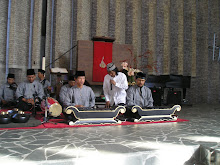
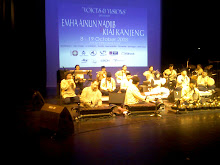

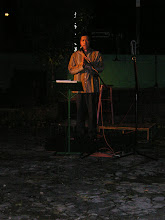



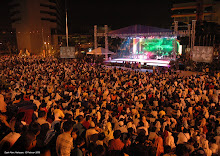
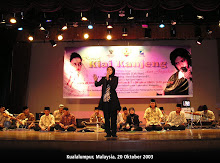
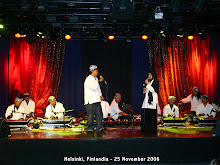.jpg)



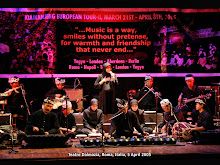


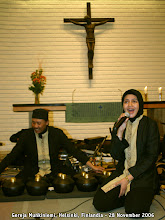.jpg)

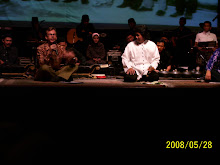.jpg)
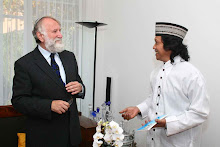
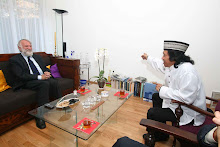
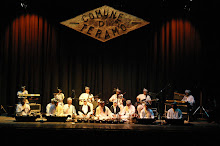


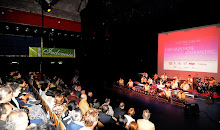

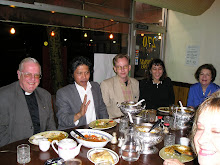


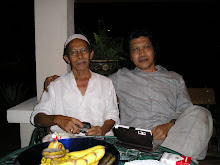
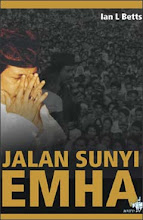
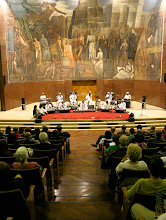
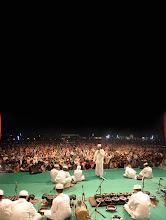

No comments:
Post a Comment